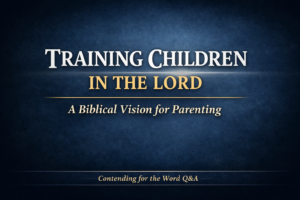⏱️ Estimated Reading Time: 4 min read
The Subtle but Serious Dangers of “Jesus and Therapy” Theology
Series Theme: Discerning the Times – Answering Today’s Most Urgent Questions
This Contending for the Word Q&A examines the growing trend of “Jesus and therapy” theology. We contrast therapeutic language with biblical categories—sin, repentance, sanctification, and the sufficiency of Scripture— and explain why Christ alone must remain the lens for all truth claims.
Audio player will appear here once the SermonAudio embed is added.
Video player will appear here once the embed is added.
Q: What Is the Danger of “Jesus and Therapy” Theology?
In recent years, there has been a noticeable rise in what some call “Jesus and therapy” theology—a mindset that blends biblical language with secular psychological frameworks. This approach often elevates feelings, trauma narratives, and therapeutic language to a near-sacred level, while diminishing or redefining the authority of Scripture, sin, repentance, and sanctification.
But what’s the danger in all of this? Why does it matter if someone talks about Jesus and therapy in the same breath? Let’s take a closer look.
Confusing the Sufficiency of Scripture
When believers say they need Jesus and therapy—but elevate therapy to a functional authority over Scripture—they risk denying the Bible’s sufficiency. 2 Peter 1:3 says God has given us “everything we need for life and godliness” through the knowledge of Him. Biblical counseling flows from this belief, seeing the Word of God as fully sufficient to address the real problems of the human heart. By contrast, secular therapy often begins with a man-centered, sin-minimizing, or God-neglecting worldview.
Redefining Sin as Dysfunction or Trauma
In the Jesus + therapy framework, sin is often reframed as the result of someone else’s failure or past trauma—rather than rebellion against God. This shift distorts the gospel and offers relief rather than repentance. Psalm 51:4 reminds us that sin is, first and foremost, “against [God].” When sin is reduced to woundedness, the cross becomes unnecessary, and Christ is presented as a life coach rather than the Savior.
Making Feelings the Final Authority
Feelings matter—God made us emotional creatures. But when therapy-centered theology elevates feelings over facts, or personal experience over divine revelation, it places man’s voice above God’s. This mirrors the tragic refrain of Judges 21:25: “Everyone did what was right in his own eyes.” God calls us to renew our minds (Romans 12:2), not merely validate our emotions.
Undermining the Church and Biblical Counseling
Therapy-centered theology tends to isolate believers rather than draw them into biblical community. Instead of seeking wisdom from elders (Hebrews 13:17) or confessing sin to one another (James 5:16), people are often pointed to licensed professionals who may not share a biblical worldview. This shifts the focus from sanctification to self-help.
Minimizing the Power of the Gospel
At the heart of the gospel is transformation—not mere coping. The gospel offers freedom from sin, hope in suffering, and the indwelling power of the Holy Spirit (Romans 8:1–11). “Jesus and therapy” theology often stops short of that, comforting without confronting, empathizing without exhorting. True healing comes not through emotional validation, but through repentance, faith, and growth in grace.
Christ Alone Is Enough
The answer to our deepest wounds and sins is not “Jesus and therapy.” It is Christ alone—crucified, risen, reigning, and returning. We’re not dismissing every helpful tool or wise counsel. But therapy must never become the lens through which we interpret Scripture. Rather, Scripture must be the lens through which we evaluate every truth claim—including those in the therapy world. Let us stand firm on the sufficiency of God’s Word and the transforming power of His grace.
Dave Jenkins is happily married to his wife, Sarah. He is a writer, editor, and speaker living in beautiful Southern Oregon. Dave is a lover of Christ, His people, the Church, and sound theology. He serves as the Executive Director of Servants of Grace Ministries, the Executive Editor of Theology for Life Magazine, the Host and Producer of Equipping You in Grace Podcast, and is a contributor to and producer of Contending for the Word. He is the author of The Word Explored: The Problem of Biblical Illiteracy and What To Do About It (House to House, 2021), The Word Matters: Defending Biblical Authority Against the Spirit of the Age (G3 Press, 2022), and Contentment: The Journey of a Lifetime (Theology for Life, 2024). You can find him on Facebook, Twitter, Instagram, Youtube, or read his newsletter. Dave loves to spend time with his wife, going to movies, eating at a nice restaurant, or going out for a round of golf with a good friend. He is also a voracious reader, in particular of Reformed theology, and the Puritans. You will often find him when he’s not busy with ministry reading a pile of the latest books from a wide variety of Christian publishers. Dave received his M.A.R. and M.Div through Liberty Baptist Theological Seminary.




